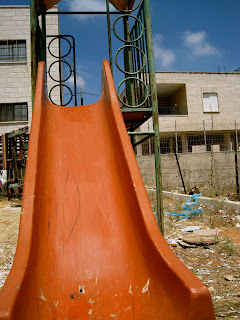Thursday, July 15, 2010
What Is, Home.
Tuesday, July 6, 2010
For Milad, Forever Ago
Thursday, July 1, 2010
The Inevitable Israeli/Palestinian Discussion: My Take



(Photos: An abandoned playground in Samaria)
The world will break into your home and leave your ideals shattered and lying at the doorstep. For in the end, when you actually stop and think about it, we are people. Does that seem too simple? It is. The World is a people. It is a geographical shuffling and dealing out of humanity, humanity that creates countries and cities and towns and neighborhoods and homes. But in the end, the individual unit is a person, the building blocks of the universe as we know it. And it is easy to say this, because I am an individual and you, reading this, are an individual, and through that we acknowledge our humanness. But we seem to think as everyone else, every not-us, as being collective. We label them liberal or conservative, religious or atheist, Palestinian or Israeli, hippy-granola-humanitarian-tree-hugger or red-blooded-shotgun-wielding-big-game-hunter. But in that we lump together people just as unsettled and un-label-able as ourselves. We reserve individuality for our personal self and feel perfectly comfortable packaging and selling the rest of the world Costco style in large boxes with excess saran wrap.
A friend of mine just came back from a conversation with an Orthodox Jew. They met at a shop in the Old City of Jerusalem and talked for 2 hours, everything from religion to politics to surfing to pregnant wives. And here’s the thing: what my friend realized is that the man he just had coffee with is a person. Read that last sentence again. Profound? Probably not, but just chew on it. Sure, he knew before his mind registered it that the man across from him was a human on a general, anthropological level, as if realizing that the world is made up of people is an epiphany. But what I don’t know if he realized is that he is a person, an individual, an entity that cannot be lumped together with anything else and sold as a set because it is incomprehensible and incompatible with anything outside of itself.
And the rub of it all is that once we realize this, once we acknowledge the peopleness of the world, it becomes quite the untidy mess. No longer can we, my friend and I, be true American Patriots by blindly backing the nation of Israel and its war against Palestine, because we have been here, we have driven through the check points to Bethlehem and the West Bank, we have eaten meals with Milar and Josef and their families and we have come to know them and love them. But we cannot flip the bird to the conservative man and give in to the temporarily trendy pull of siding with those downtrodden and oppressed by “Western Enlightenment Modernity,” because we have conversed with the Orthodox Jews over coffee, we have seen the desire of an old Samaritan man begging for peace in his homeland, we have been to the Holocaust Museum to be forever haunted by a world inexplicable.
Thus is the humanity of it all. If we had not sat with people from both sides, if we had not shared life and its grief with the individuals who have lived out the tragedy of it, then we could carry on with our tidy packaging and labeling of idealized products. But that cannot be. I cannot choose one side or the other, because to do so would be to deny the realness, the reality, the personhood of someone I know, and know to be an individual. This is not to say there is no right and no wrong. Amongst the entire rainbow grey of the world, there are things in black and white. But it is to say this: know that the world is made of people. Know those people. Don’t box them up, do not pretend to know their heart because of a name defining their ethnicity. Simply sit, and be with them. Acknowledge the beauty of their personhood, and grieve with them because of it. Only when we realize that our ideals, our world issues, handle the fate of people can we come to the drawing board and begin to create a map with any accuracy. Choose right over wrong, justice over injustice, good over evil. But be slow. And do it with a heavy heart.





